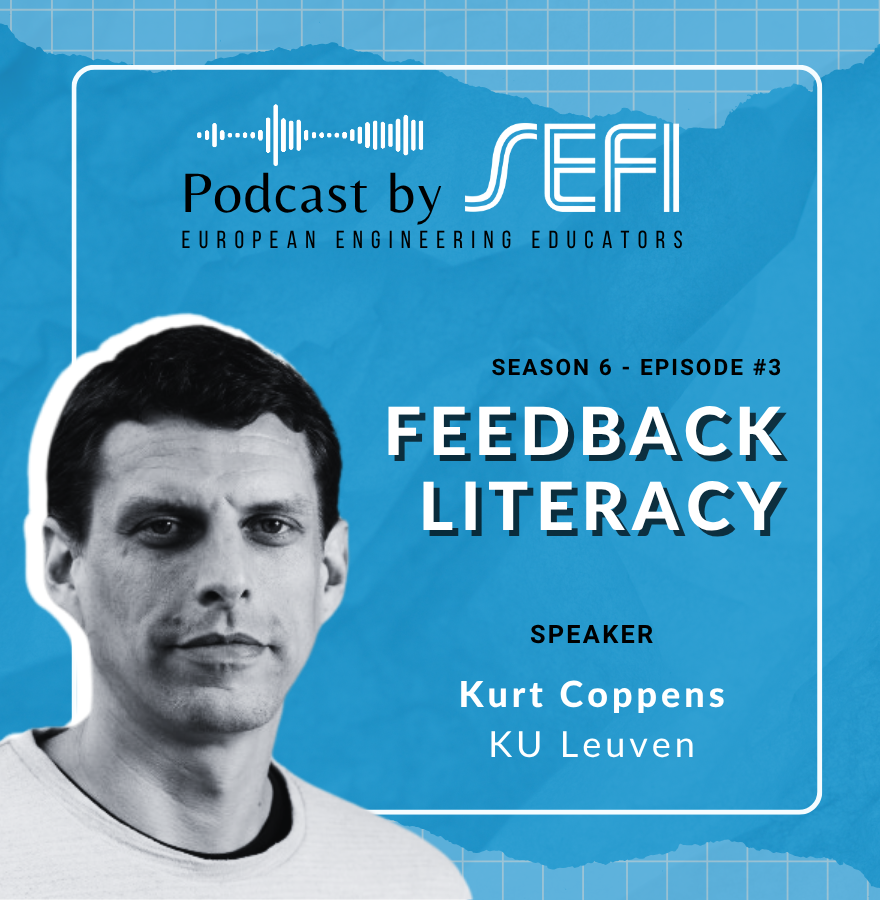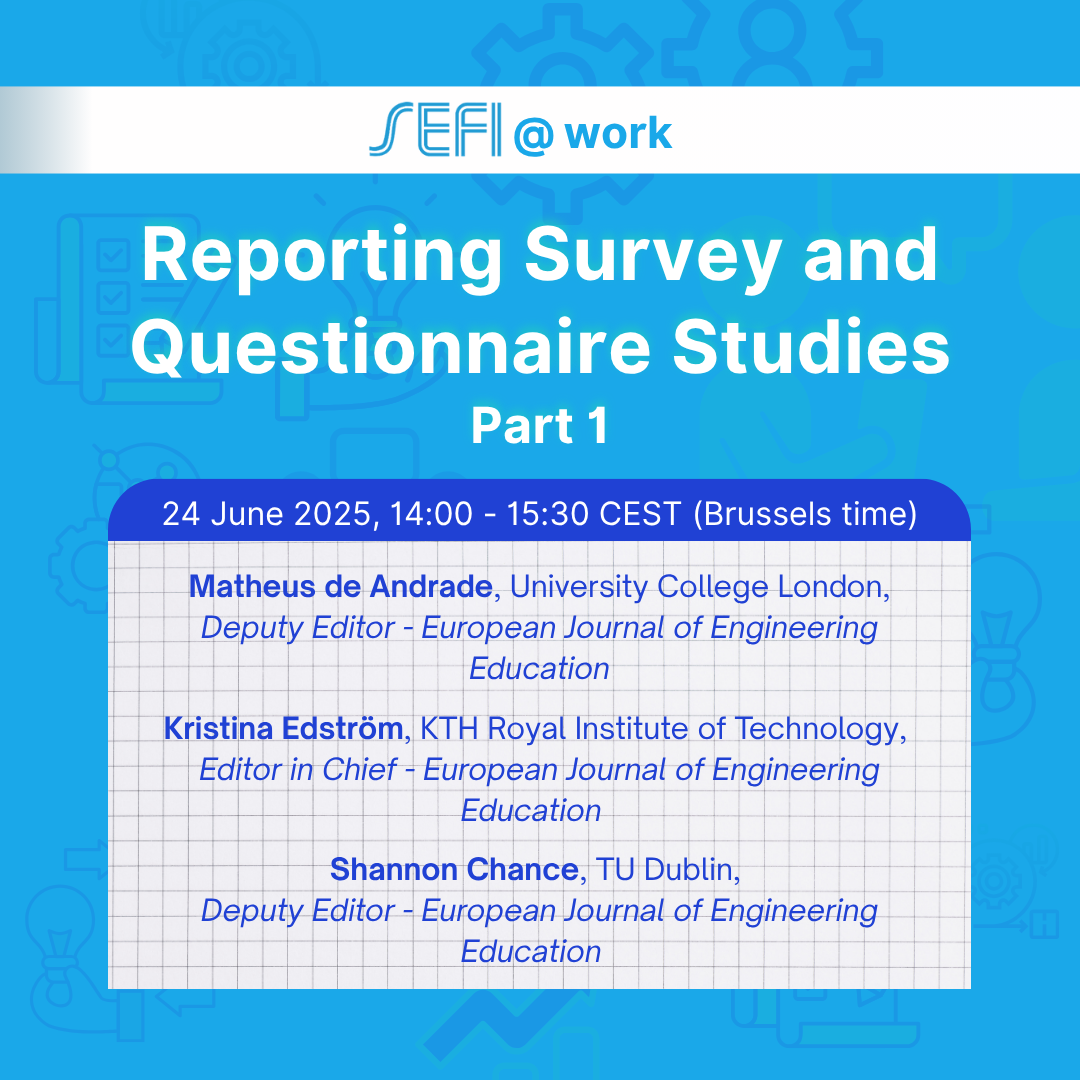Feedback is a somewhat perennial topic within higher education (HE), with increasing emphasis on students…
Call for papers: EJEE Special Issue
Theme: Online Laboratories in Higher Engineering Education
Solutions, challenges, and future directions from a pedagogical perspective
Planned Submission Process
Deadline for extended abstracts (800-1000 words) ……. 31 October 2020
Notification of invitation for full paper submission …… 15 December 2020
Full paper submission due date ………………………………… 15 April 2021
Reviewer feedback …………………………………………………. 15 June 2021
Final paper submission due date ………………………………. 30 September 2021
Special Issue publication ………………………………………… December 2021
Instructions for authors
Extended abstracts are submitted here.
Instructions for preparing the full paper manuscript.
Aims and objectives
This special issue invites international researchers in the area of online laboratories to come together and display the current status, recent research results and future directions of online laboratory design, development efforts, and scholarly research. A particular focus lies on theoretical reflection and in-depth empirical work on pedagogy and instruction, in the context of online laboratories. Submissions should draw conclusions from empirical investigations or research reviews. Hence, the special issue will enable both practitioners and research scholars to identify challenges and opportunities for laboratory education in the context of online distance engineering. The ultimate aim is to prepare an engineering workforce capable of facing future challenges in an increasingly digitally connected world.
Background of the theme
The laboratory in engineering education is a place where theoretical and conceptual knowledge can be applied to practice and where theoretical and conceptual knowledge can be developed through practice (Bernhard, 2010). Because of its importance for engineering education, the integration of laboratories has a long tradition and practice-oriented laboratories are an essential part of nearly every engineering curriculum (Abdulwahed & Nagy, 2009; Feisel & Rosa, 2005; Sheppard, Macatangay, Colby, & Sullivan, 2008; Tekkaya et al., 2016; Zubía & Alves, 2012). Laboratory education furthermore aims at the students’ development of technical knowledge, empirical skills, practical skills, and field-specific as well as overarching competences through independent scientific inquiry (Feisel et al., 2002; Gustavsson et al., 2009; Kammasch, 2006).
Over the last years, the introduction of digital media not only affected the general way of teaching and learning in higher education, but especially effected laboratory learning. That led to the emergence of virtual laboratory equipment, augmented laboratories, and remote laboratories – subsumed under the term Online Laboratories (Abdulwahed & Nagy, 2009; Auer, Zutin, &
Mujkanovic, 2015; Azad, Auer, & Harward, 2011; Gomes & Zubía, 2007; Gustavsson et al., 2009; Heradio et al., 2016; Lowe, Murray, Li, & Lindsay, 2008; Pester & Auer, 2011). The term remote laboratory describes a test setup that uses physically existing experimental equipment, but the experimental procedure can be conducted via the internet from virtually everywhere and
at any time. Augmented laboratories include experimental setups, which are enhanced with augmented reality during experimentation, e.g., to display real time data at experimental equipment’s point of origin. Virtual laboratories refer to virtual environments and make use of simulations instead of real equipment for the experimental procedure.
All of the above-mentioned approaches include opportunities as well as challenges in terms of flexibility, capacity, range, audience, and teaching and learning methods. Although online labs have been around for some time, the questions around their pedagogical solutions, challenges and future directions haven’t been sufficiently discussed with a thorough engineering education research perspective so far.
Criteria for contributions
Empirical investigation submissions should describe the questions addressed and their context relative to prior knowledge on the subject. They should present relevant theories, justify the research design decisions, and describe the research methods to permit an evaluation of their quality. The data must support the interpretation of the results. Research reviews should clearly state the purpose, scope or research questions addressed by the review. A review should include a critical analysis, synthesis, or evaluation of previous research to provide new perspectives, a new knowledge structure, general conclusions or overarching principles, or new research directions.
Significance of the topic
The proposed special issue is unique and timely as it will open up new views on online labs in engineering education by combining multiple perspectives on that topic. These perspectives include but are not limited to, first, different educational approaches (from instruction to exploration for different online labs types), second, different approaches for evaluation (qualitative and quantitative) or, third, a combined approach. Hence, this special issue focusses the educational perspective (in comparison to the technical view) on the introduction and usage of online laboratories. This includes the debate around instructional online lab design, intended learning outcomes, student assessment, and evaluation.
References
Abdulwahed, M., & Nagy, Z. K. (2009). Applying Kolb’s experiential learning cycle for laboratory education. Journal of engineering Education, 98(3), 283-294.
Auer, M. E., Zutin, D. G., & Mujkanovic, A. (2015). A Toolkit to Facilitate the Development and Use of Educational Online Lab-oratories in Secondary Schools. Paper presented at the Proceedings of 1120 ASEE Annual Conference, Seattle, WA.
Azad, A. K. M., Auer, M. E., & Harward, V. J. (2011). Internet Accessible Remote Laboratories: Scalable E-Learning Tools for Engineering and Science Disciplines: Scalable ELearning Tools for Engineering and Science Disciplines. Hershey: IGI Global.
Bernhard, J. (2010). Insightful learning in the laboratory: Some experiences from 10 years of designing and using conceptual labs. European Journal of Engineering Education, 35(3), 271-287.
Feisel, L. D., Peterson, G. D., Arnas, O., Carter, L., Rosa, A., & Worek, W. (2002). Learning objectives for engineering education laboratories. Paper presented at the 32nd Annual Frontiers in Education.
Feisel, L. D., & Rosa, A. J. (2005). The role of the laboratory in undergraduate engineering education. Journal of engineering Education, 94(1), 121-130.
Gomes, L., & Zubía, J. G. (2007). Advances on remote laboratories and e-learning experiences (Vol. 6). Deusto, Bilbao: Universidad de Deusto.
Gustavsson, I., Nilsson, K., Zackrisson, J., Garcia-Zubia, J., Hernandez-Jayo, U., Nafalski, A., . . . Pettersson, M. I. (2009). On objectives of instructional laboratories, individual assessment, and use of collaborative remote laboratories. IEEE Transactions on learning technologies, 2(4), 263-274.
Heradio, R., De La Torre, L., Galan, D., Cabrerizo, F. J., Herrera-Viedma, E., & Dormido, S. (2016). Virtual and remote labs in education: A bibliometric analysis. Computers & Education, 98, 14-38.
Kammasch, G. (2006). Labordidaktik in der Diskussion: Das Labor und die Nutzung seiner methodischen Vielfalt im derzeitigen Umstrukturierungsprozess der Hochschulen. In B. Berendt, H.-P. Voss, & J. Wildt (Eds.), Neues Handbuch der Hochschullehre. Stuttgart: Dr. Josef Raabe Verlags GmbH.
Lowe, P., Murray, S., Li, D., & Lindsay, E. (2008). Remotely Accessible Laboratories– Enhancing Learning Outcomes. Australian learning and Teaching Council, Sydney.
Pester, A., & Auer, M. E. (2011). Online-Labore-Formen, Einsatz in der Lehre, Beispiele und Trends.
Sheppard, S. D., Macatangay, K., Colby, A., & Sullivan, W. M. (2008). Educating Engineers: Designing for the Future of the Field. Book Highlights. Carnegie Foundation for the Advancement of Teaching.
Tekkaya, A. E., Terkowsky, C., Radtke, M., Wilkesmann, U., Pleul, C., & Maevus, F. (2016). Das Labor in der ingenieurwissenschaftlichen Ausbildung: Zukunftsorientierte Ansätze aus dem Projekt IngLab (acatech STUDIE). Muenchen: Herbert Utz Verlag.
Zubía, J. G., & Alves, G. R. (2012). Using remote labs in education: two little ducks in remote experimentation (Vol. 8). Bilbao: Universidad de Deusto.
Special Issue Guest Editor Team
Dominik May, University of Georgia
Dominik May is Assistant Professor in the School of Environmental, Civil, Agricultural and Mechanical Engineering and member of the Engineering Education Transformations Institute of the University of Georgia (UGA). He conducts research in online engineering education and focuses on developing broader educational strategies for the design and use of online engineering equipment, putting these into practice and provide the evidence base for further development efforts. Dr. May is Vice-President of the International Association of Online Engineering (IAOE), serves as Editor-in-Chief for the ‘International Journal of Emerging Technologies in Learning (iJET)’, and is program committee member of the annual REV conference by IAOE.
Claudius Terkowsky, TU Dortmund University
Claudius Terkowsky is head of the ‘Engineering Education Research Group’ at the Centre for Higher Education of TU Dortmund University. He has been working for many years in engineering education research projects and academic development. His research fields are teaching and learning in the engineering lab, fostering creativity in engineering education, engineering education cultures, and innovative teaching and learning scenarios at the intersection of man, technology and digital media. He is co-editor of several books on engineering education and higher education research in Germany.
David Boehringer, University of Stuttgart
David Boehringer studied Ancient History, Modern History and Classical Archaeology at the Universities of Freiburg, Oxford and Heidelberg. In 1999, he wrote his doctoral thesis about hero cults in Greece from late geometric to classical times. Afterwards he trained to IT. Since 2002 he works in the media department of the computer center of the University of Stuttgart, which he has been managing since 2007. David has coordinated several large-scale projects, including the European project “Library of Labs, LiLa”, which involved building and sharing a repository of online labs, the BW-eLabs project, that aimed at the cooperative usage of remote laboratories in research and the reproducibility of research results obtained by remote labs.
Valerie Varney, RWTH University and International Association of Online Engineering
Valerie Varney is head of the research group “Digital Learning Environments” at the Cybernetics Lab of RWTH Aachen University. Her research focuses on the development, testing and evaluation of digital teaching and learning methods and tools in Engineering Education. She has a long history of working in research projects funded by the German Federal Ministry of Education and Research that focus on innovative teaching and learning in Engineering Education, e.g. the project ELLI (Excellent Teaching and Learning in Engineering Sciences). She is also part of the Executive Committee the International Association of Online Engineering (IAOE).

